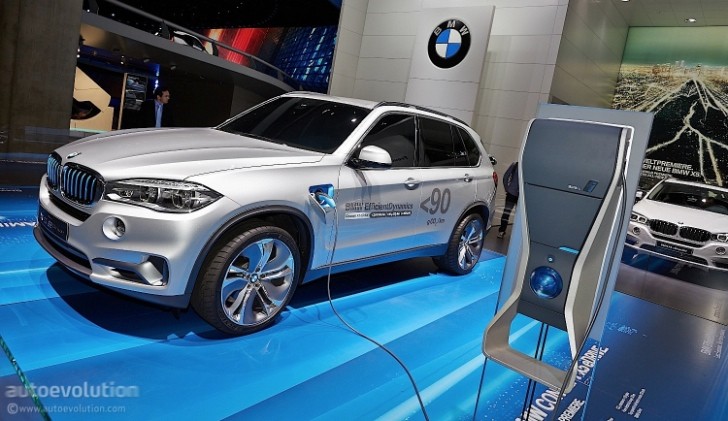BMW has long teased us with its plug-in hybrid BMW X5 that was introduced as a concept more than a year ago. Over time, the company kept intentionally leaking info about it to test the waters and even went as far as to invite some journalists to test it last summer.
No official date was revealed as to when it would be introduced in production guise until now, however, leaving us to wonder if we’re ever going to drive this thing on public roads. Well, today we learned not only that it will be built but also when production will start.
According to a leaked production chart for future models from Bavaria, the new xDrive40e will enter production this April which, in turn, means that we will see the production model at Geneva.
It will be mating a 2-liter 4-cylinder internal combustion engine making 245 HP and 350 Nm (358 lb-ft) of torque to a 95 HP and 250 Nm (184 lb-ft) of torque electric motor. Together, the output should be around 330-340 HP and 600 Nm (442 lb-ft) of torque. Impressive numbers right? They’re also the reason why the name includes the numbers 4 and 0.
The batteries will be stored in the luggage compartment and should allow you to cover up to 20 miles (32 km) on electric range alone, despite the car’s generous size. While we’re talking electric range, we should also mention that the xDrive40e should go up to 75 mph (120 km/h) in the EV mode alone.
When the two are combined, the car will do 100 km/h (62 mph) in under 7 seconds which is not shabby at all for a 2-ton SUV. The xDrive system has also been reworked along with the 8-speed gearbox to make sure fuel consumption is as low as possible. How low? We estimate around 3 l/100 km (78.4 mpg).
According to a leaked production chart for future models from Bavaria, the new xDrive40e will enter production this April which, in turn, means that we will see the production model at Geneva.
Why is it called xDrive40e?
The ‘e’ in the moniker should already ring a couple of bells but we’re explain the name in detail. The new X5 is the first of its kind, being a plug-in hybrid, stepping in the footsteps of the i3 and i8.It will be mating a 2-liter 4-cylinder internal combustion engine making 245 HP and 350 Nm (358 lb-ft) of torque to a 95 HP and 250 Nm (184 lb-ft) of torque electric motor. Together, the output should be around 330-340 HP and 600 Nm (442 lb-ft) of torque. Impressive numbers right? They’re also the reason why the name includes the numbers 4 and 0.
The batteries will be stored in the luggage compartment and should allow you to cover up to 20 miles (32 km) on electric range alone, despite the car’s generous size. While we’re talking electric range, we should also mention that the xDrive40e should go up to 75 mph (120 km/h) in the EV mode alone.
When the two are combined, the car will do 100 km/h (62 mph) in under 7 seconds which is not shabby at all for a 2-ton SUV. The xDrive system has also been reworked along with the 8-speed gearbox to make sure fuel consumption is as low as possible. How low? We estimate around 3 l/100 km (78.4 mpg).

